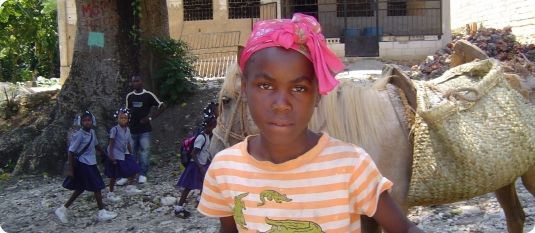Power of Partnerships: Haiti

Civil strife, poverty, natural disasters and environmental degradation have all contributed to making Haiti the 148th (of 179) least developed country in the world. In human terms, this means that many of the country’s eight million citizens are poor, hungry and suffering. Life for the littlest Haitians –children under five– is especially challenging, with nearly 75% of kids in that age group suffering from malnutrition.
Years of political instability have tremendously stressed the infrastructure of civil society and the ecology of Haiti. There is no functioning public health or educational system; only 55% of Haitian children ever attend school and 20% continue to secondary school. The economy is in tatters, with roughly two-thirds of the labor force eking out an income through the informal economy and many relying on remittances from relatives abroad for survival. To compound matters, the country is 95% deforested.
While the needs in Haiti are tremendous, there are some institutions that make a real difference in the daily lives of impoverished Haitians and in efforts to rebuild the economy, infrastructure and natural environment of the country. A leading force in this effort is the Episcopal Diocese of Haiti, Episcopal Relief & Development’s principal program partner in the country and a potent example of the power of partnership.
Episcopal Relief & Development and the Episcopal Diocese of Haiti work together on two major programs, including the Bishop Tharp Institute in Les Cayes, a two-year community college, and the Haitian Development Initiative (HDI), which provides school canteens for primary school students who would otherwise go hungry. HDI also administers a micro-finance program and assists local communities in identifying needs and implementing small development projects. These programs touch thousands of lives every year.
An additional ecumenical partnership with Haiti Fund Inc. supports the Comprehensive Development Project (CODEP), which is working to alleviate hunger by implementing reforestation and farmer training programs in the mountainous areas of southern Haiti. This program focuses on imparting the building blocks of sound agricultural management to local farmers, including trainings on improving the soil quality of farmland and creating clean water sources.
These projects are tasked with operating in a climate of extreme socio-political instability. Haiti has been especially hard hit by the global food crisis, which is driving food prices to levels that average Haitians cannot afford. In April 2008, riots broke out across the country, temporarily interrupting program operations. With no end to rising prices in sight, tensions remain high as more people become chronically hungry.
In the summer of 2008, four tropical storms – Fay, Gustav, Hannah and Ike – hit Haiti in the space of one month, impacting nine out of ten regional departments. As tree cover is a natural protection against flooding, deforestation contributed to the high level of destruction across the country. An already weak infrastructure was taxed beyond repair, entire communities were stranded, and harvests were obliterated, interrupting the flow of an already stressed society.
Our partners in implementation – priests and development officers – were gravely impacted at a personal level by these crises. Many lost their own homes and spent their time coordinating relief efforts while assisting their own families as they struggled to recover.
Yet, even under these dire circumstances, our partners in Haiti see reason for hope. They are still engaged, adapting, pushing forward and touching more lives. For example, the Haitian Development Initiative recently refocused its program on hunger alleviation in response to growing numbers of hungry people and added a water and sanitation component to repair the water systems destroyed by storms. Because the level of environmental destruction in Haiti is directly related to deforestation, CODEP scaled up its reforestation program and planted one million trees in 2008.
“The resiliency of the Haitian people, and thus our programs with the Haitian Church, is impressive,” said Matt St. John, Program Officer for Latin America and the Caribbean at Episcopal Relief & Development. “But 2008 was a very difficult year for Haiti. We will have to redouble our efforts now to regain what was lost last year.”
The areas of highest priority for ongoing work in Haiti involve water: protecting people from being inundated by it and making sure that they have enough clean water to drink. Given Haiti’s vulnerability to catastrophic storms, the CODEP program would like to plant even more trees to increase their reforestation program, which would improve soil quality and prevent flooding and landslides. The Episcopal Diocese of Haiti continues to undertake disaster relief and could benefit from more support for its sanitation program that builds latrines and wells.
“The needs of Haiti are great, but the desire for Haitians and the Haitian Church to improve their country is even greater,” said St. John.
Click here to learn more about Episcopal Relief & Development’s program in Haiti.


